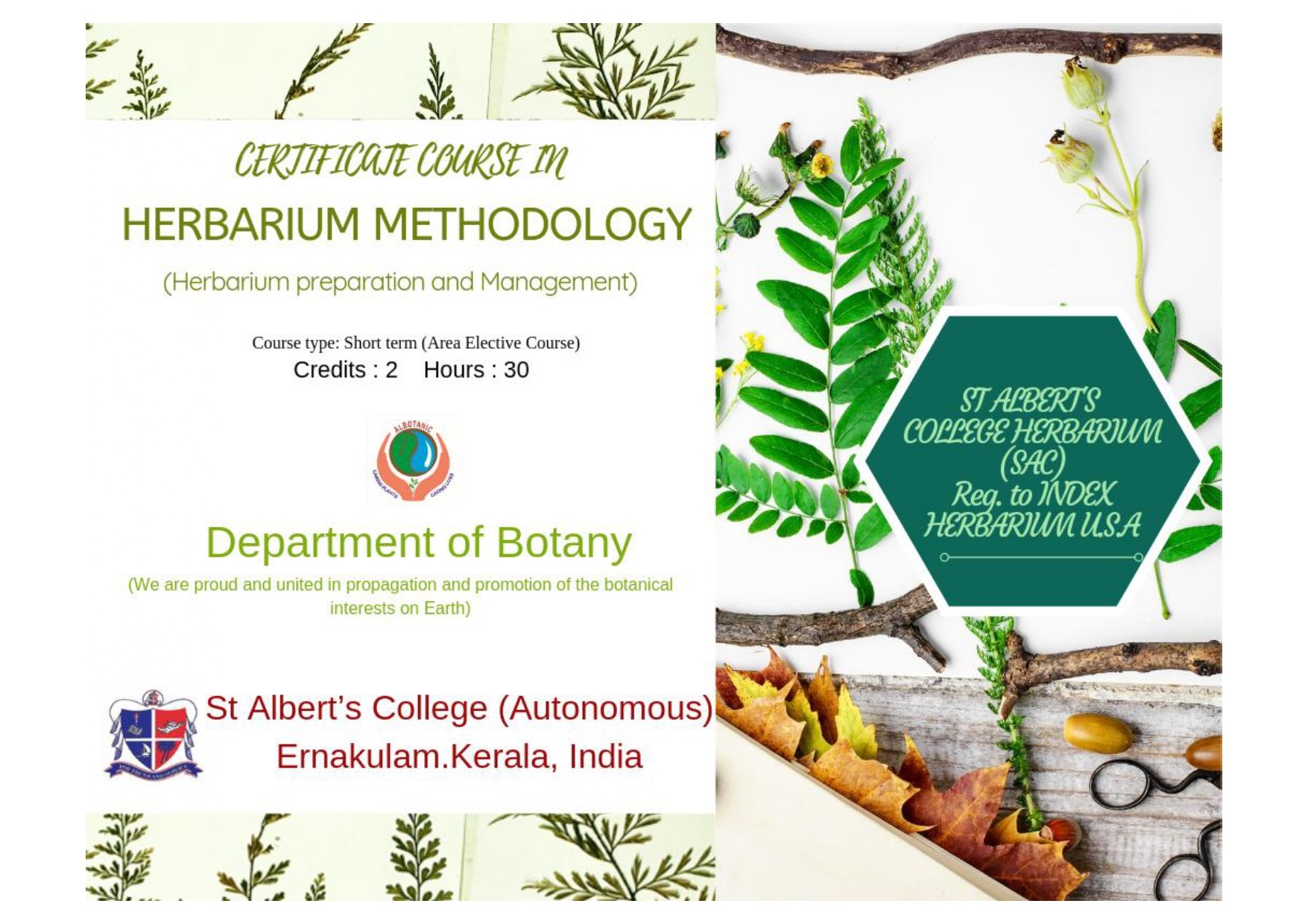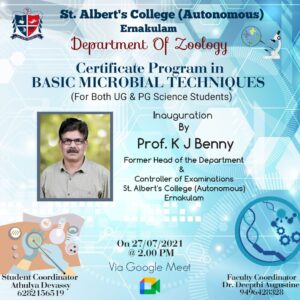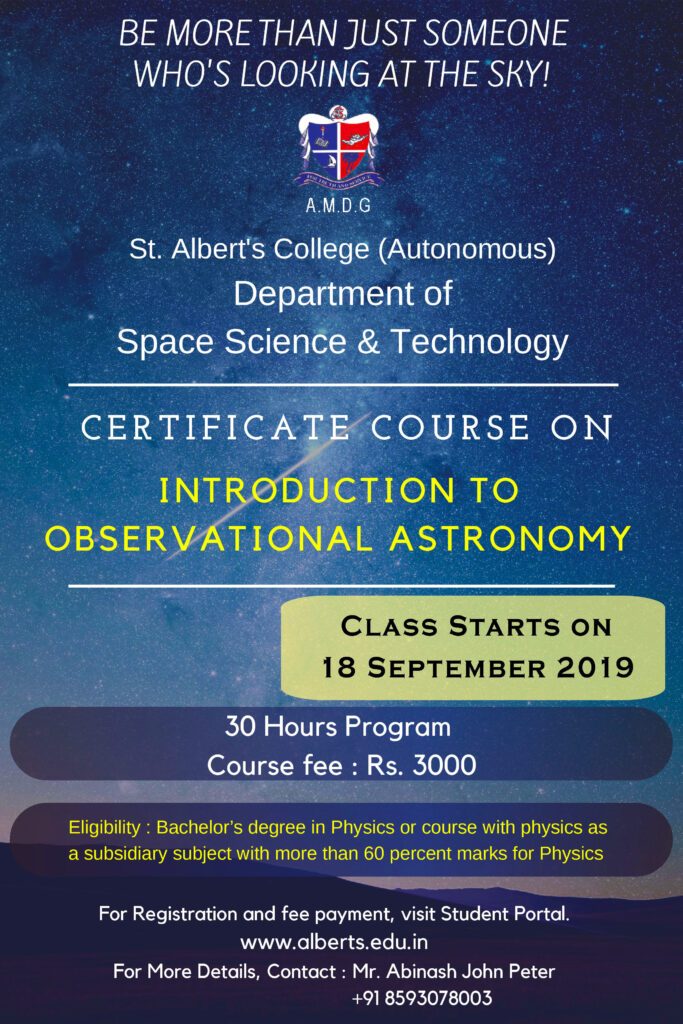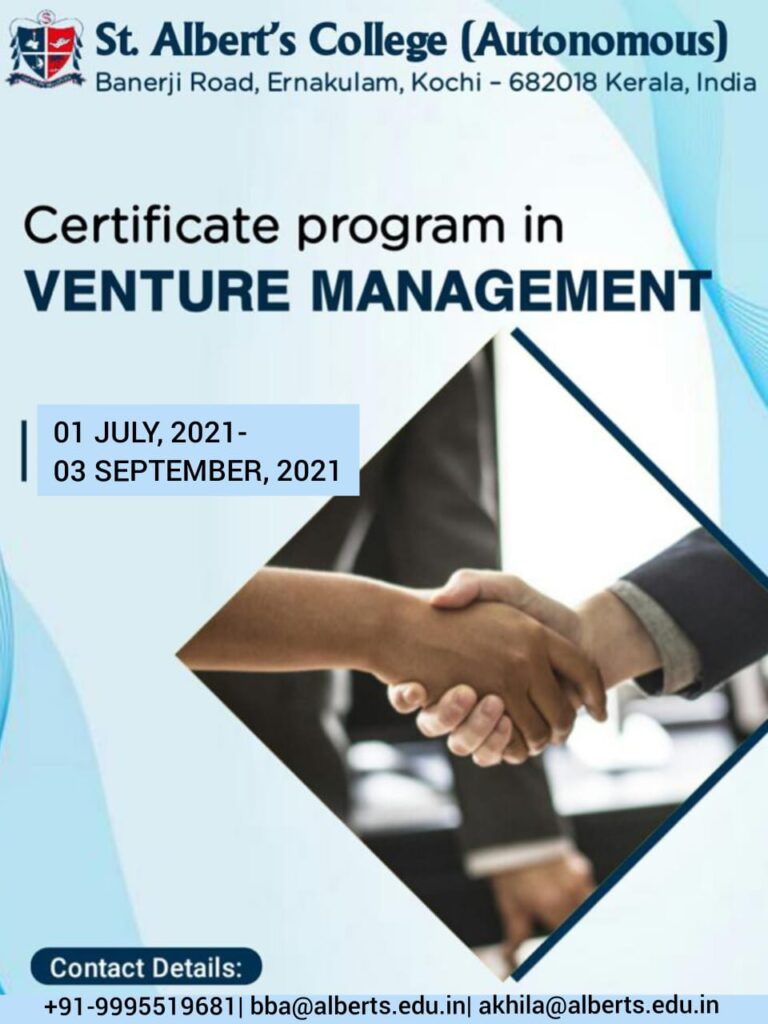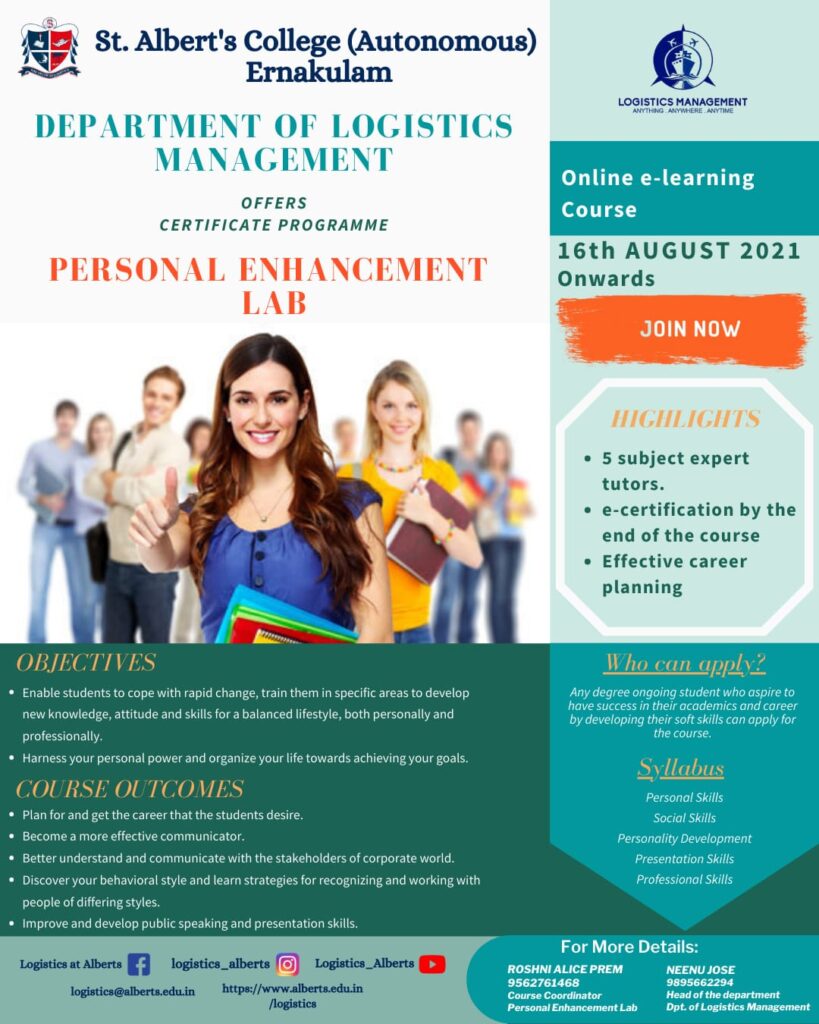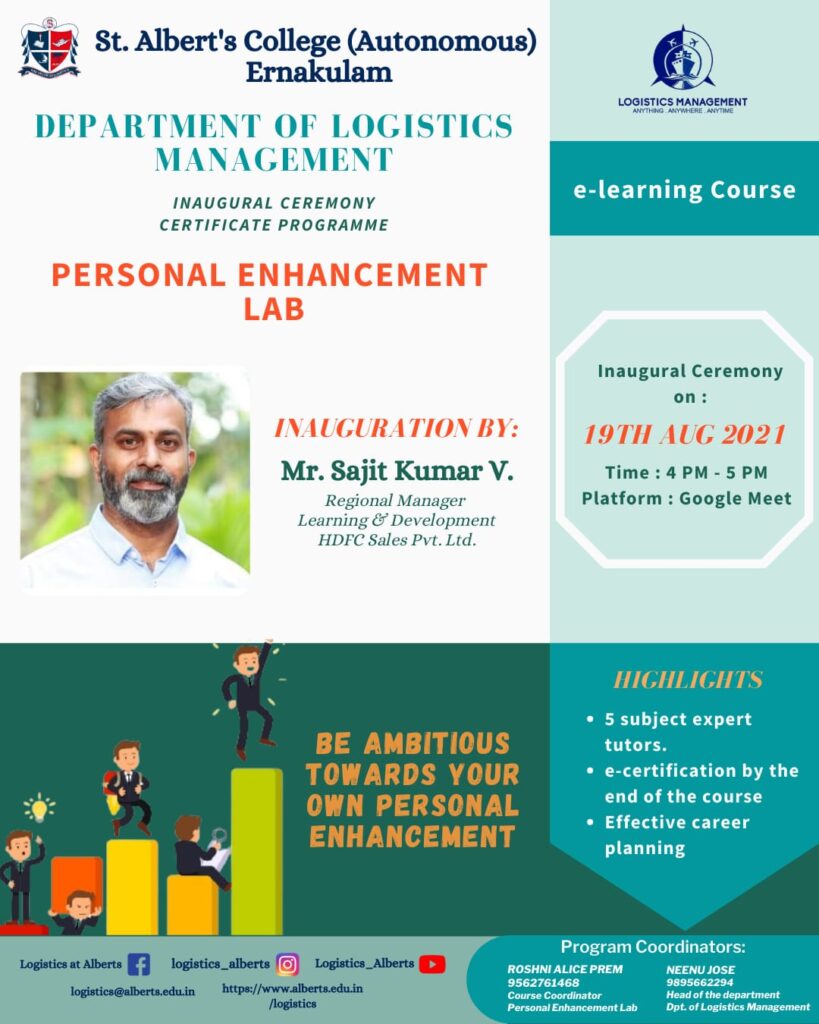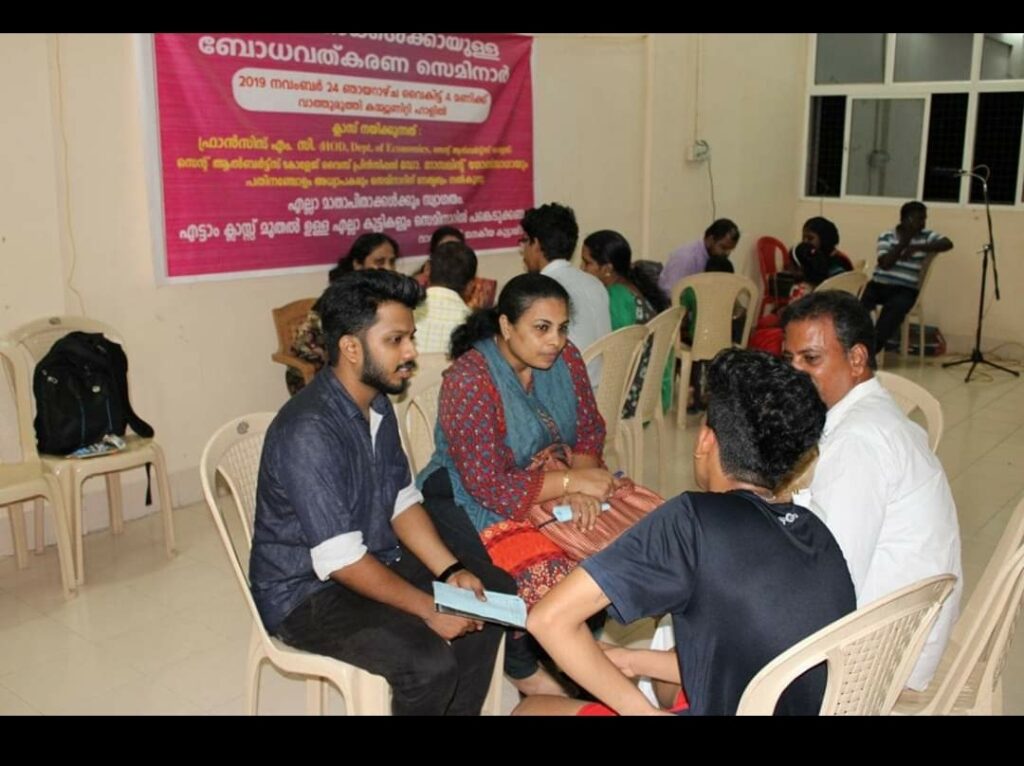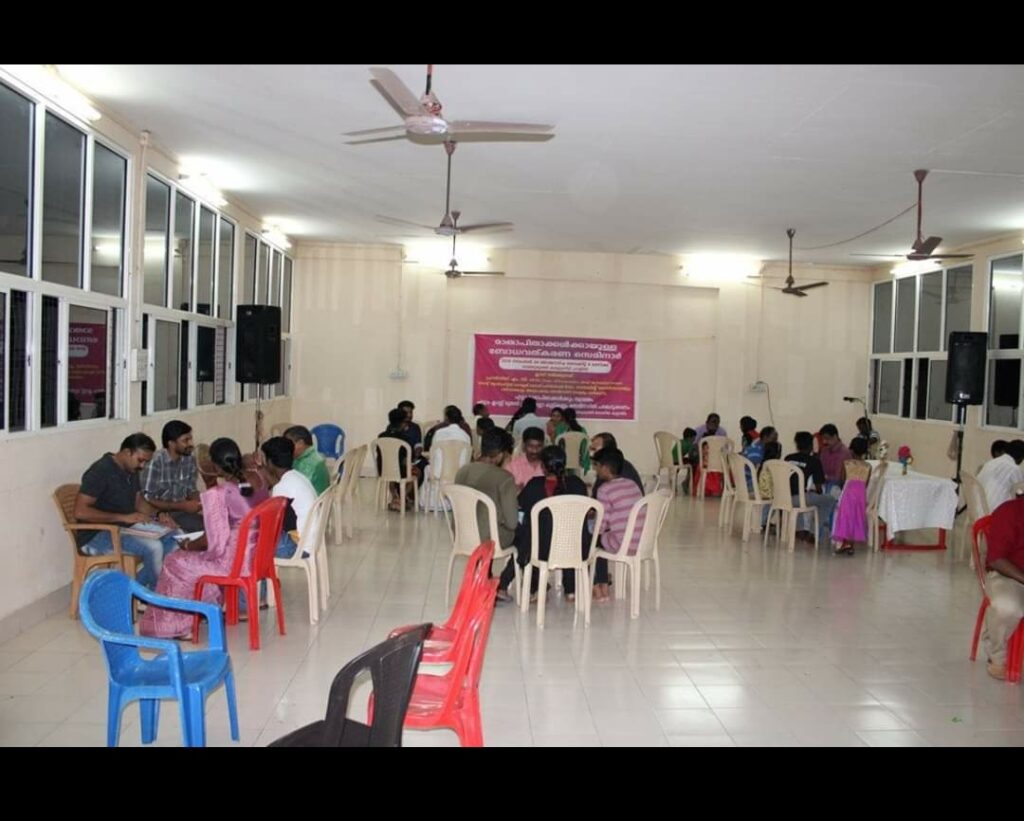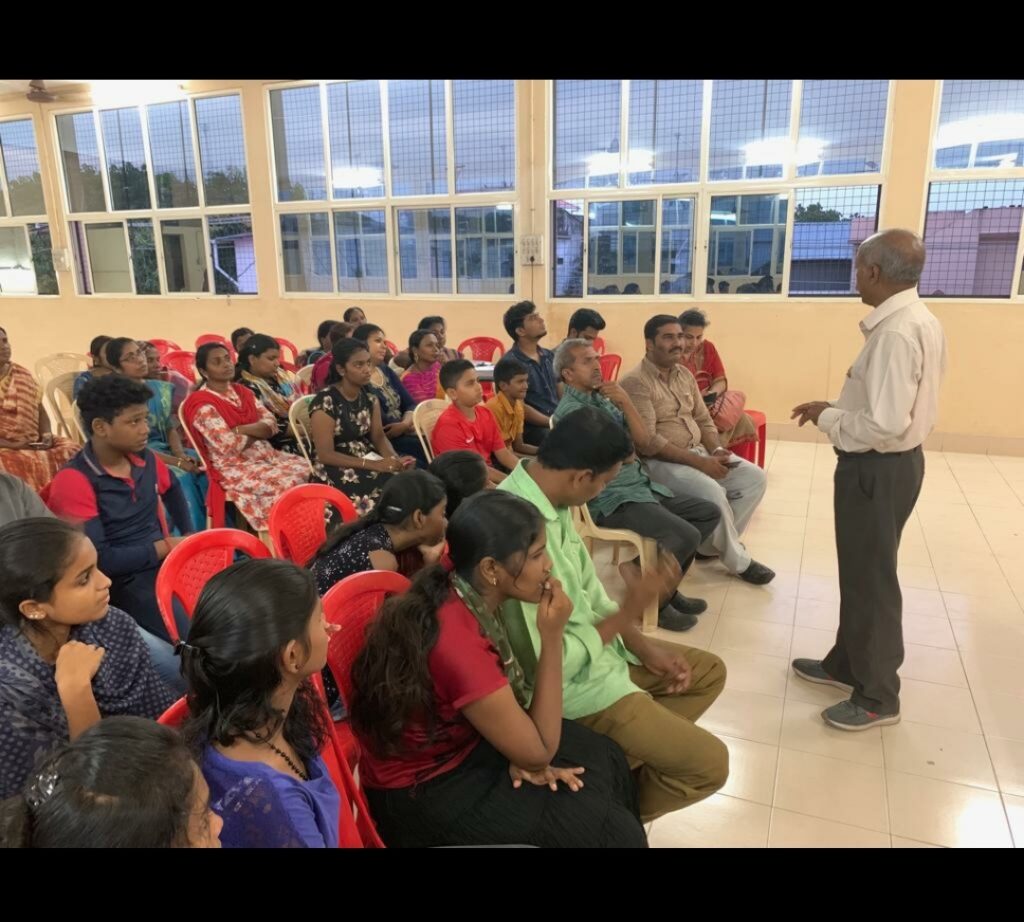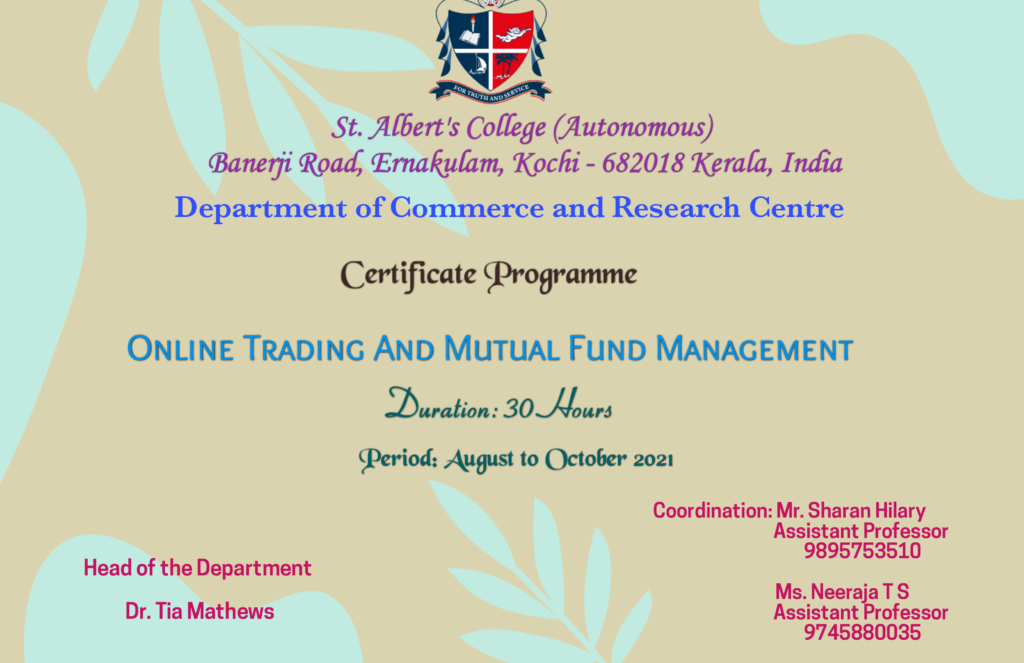Department offers certificate course in ‘Basic Microbial Techniques.’ It’s of 30 hrs duration, which includes 12 hrs of hands on training on isolation and identification of microbes. The course coordinator is Dr. Deepthi Augustine who specializes in ‘Medical Microbiology.’ The course fee is 1000/ student and is open to all UG & PG disciplines.
Certificate Programs are add on courses apart from the curriculum to help students to get job in the industry or to become young entrepreneurs. The Department of Renewable Energy organized a Certificate Programme in “ Entrepreneurship in Solar Photovoltaic System” of 3 month duration. It is a 30 hour program including theory and practicals of total credit 2.
Syllabus of the Certificate Programme
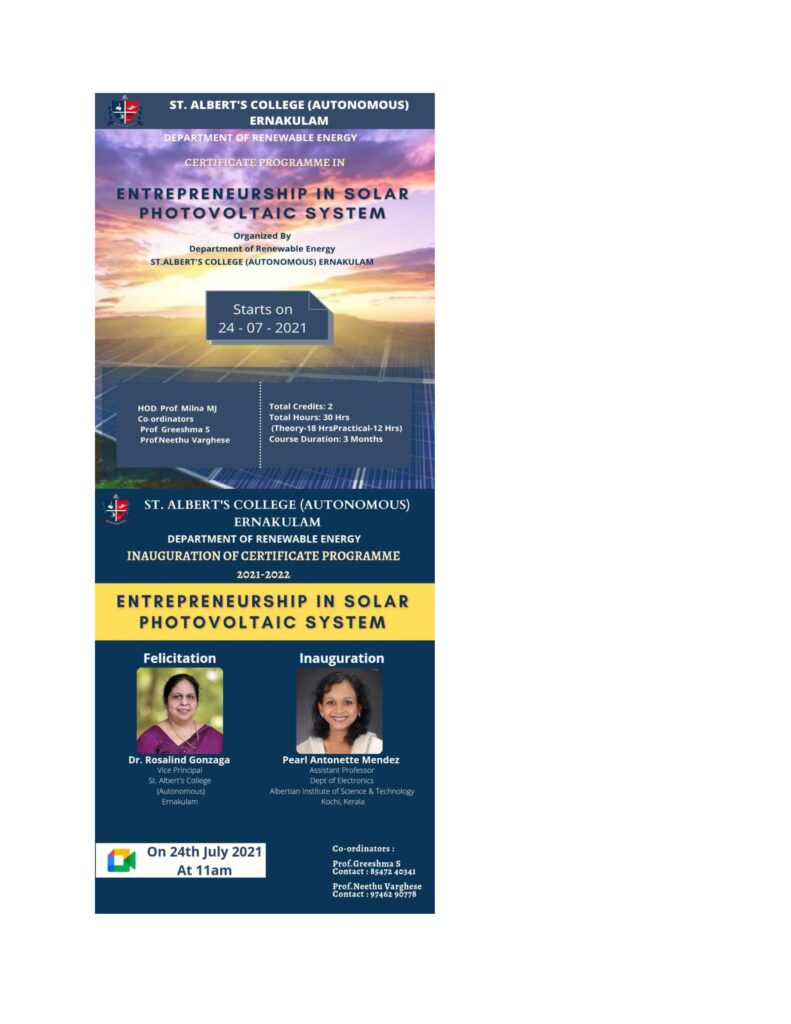
Certificate Programme on Numerical and Reasoning Ability
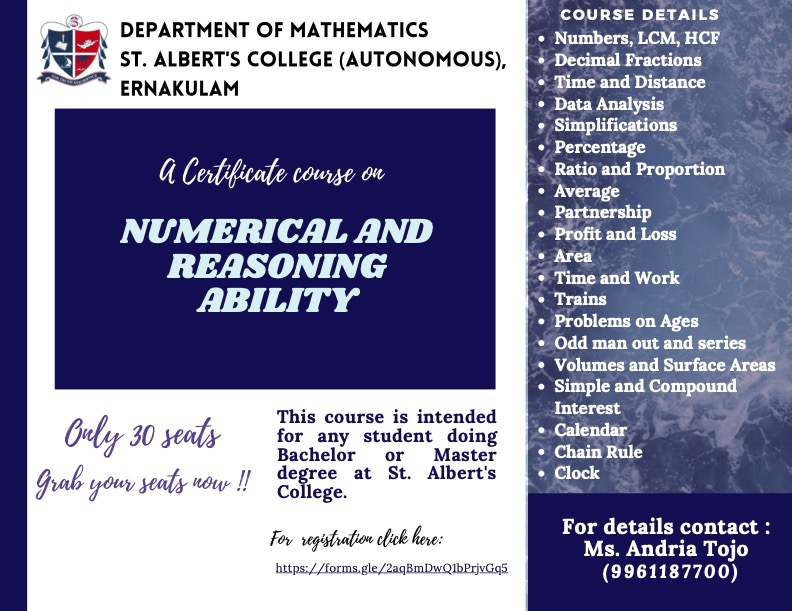
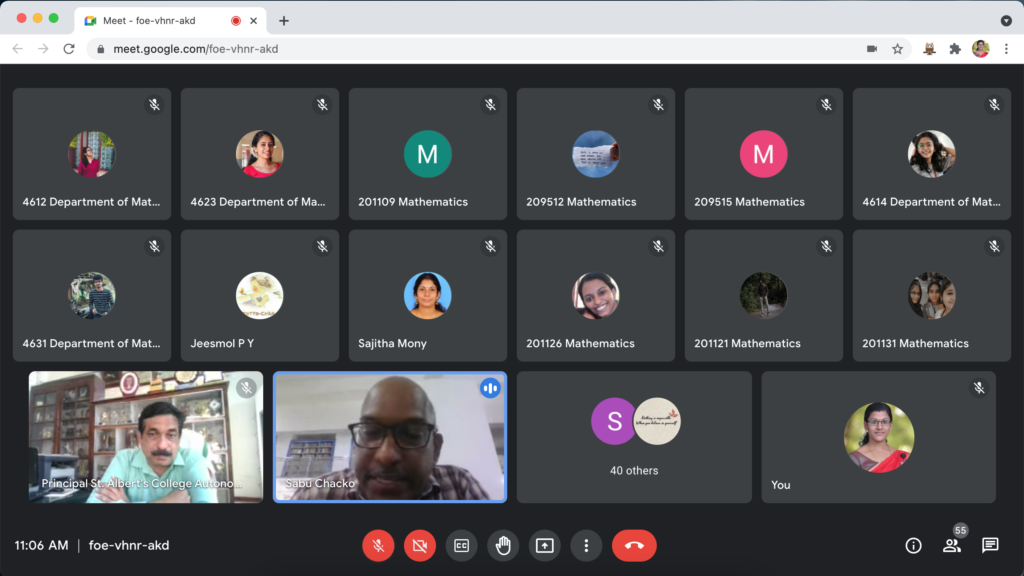
On 17th September 2021, Department of mathematics organised the inauguration of the Certificate Course on Numerical and Reasoning Ability, Certificate Course on Advanced Excel and coaching classes of CSIR NET and NBHM entrance. Programme started at 11.00 am with a prayer song by Sr. Rincy of II MSc . Welcome speech was delivered by Mydhily M Rajeev of III BSc, followed by a presidential address by Dr. Sabu M C, Head, Department of Mathematics. Inaugural speech was given by Dr. M A Solomon, Principal, St. Albert’s College (Autonomous).
A small description about Certificate Course on Numerical and Reasoning Ability was given by Ms. Divya Mary Daise S and a description about Certificate course on Advanced Excel was given by Dr. Sajithamony T M. Programme came to an end at 11.45 am. Vote of thanks was delivered by Sharon M Roy of II BSc. Dhanya Joy of II Msc was the Master of Ceremony. A total of 54 students were present.
First session of certificate course on numerical and reasoning ability was conducted on 22nd September 2021. Second session was on 28th September 2021. Both the sessions on the topic ‘Calendar’ were handled by Ms. Jeesmol P Y. Third session of certificate course on numerical and reasoning ability was conducted on 29th September 2021. The session was on the topic ‘Average’ and was handled by Ms. Divya Mary Daise S. Fourth session was on 2nd October 2021. It was on the topic ‘Chain Rule’ and was handled by Ms. Ritty Jacob. Fifth session of certificate course on numerical and reasoning ability was conducted on 6th October 2021. Sixth session was on 15th October 2021. Both the sessions on the topic ‘Time and Work’ were handled by Ms. Golda Mary Joseph. Seventh session of certificate course on numerical and reasoning ability was conducted on 21st October 2021. It was on the topic ‘Chain Rule’ and was handled by Ms. Ritty Jacob. Eighth session was on 23rd October 2021. The session was on the topic ‘Average’ and was handled by Ms. Divya Mary Daise S.
LaTex
Launch of Certificate Programme in Media Studies
As part of the launch of Certificate Course in Media Studies, expert lectures were conducted for the benefit of the students. The introductory talk on ‘Introduction to Media Studies’ was given by Dr. Appu Jacob John, Assistant Professor, Institute of English, University of Kerala. Another lecture on the important aspect of Ethics in Media was delivered by Dr. Monali Chatterjee of Institute of Management Studies of Nirma University, Ahmedabad. The coordinator of the course is Dr. Mary Sapna Peter Miranda
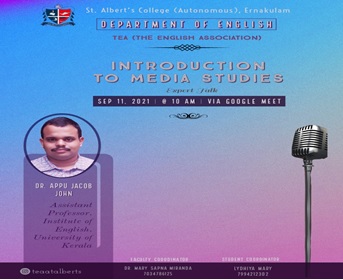
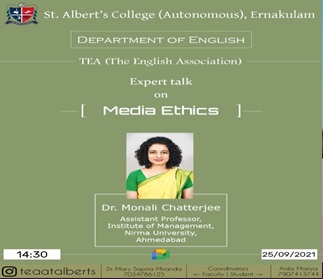
The Albertian English Language Programme
Course Coordinator: Dr. Sapna Miranda
Credit: 2
Contact Hours: 30
Mode of Assessment: Oral & Written
Course Overview:
This course is designed for students learning English at different levels to acquire and develop the English language knowledge and skills. The course is defined within the Common Reference European Framework and is divided into Basic, Intermediate and Advanced levels.
The aim of the syllabus is to prepare students to use English for their studies in college and consequently for their professional needs in real life and work. This preparatory course will further give the students the opportunity to speak on general topics, to communicate in Business environment and to understand texts on general topics.
The English Language Programme course incorporates 3 basic components:
- General English
- Spoken English
- Business English
The course aims at developing a wide range of skills:
- Communication skills, especially spoken skills which cover communication situations.
- Language Development, which involves grammar and extensive vocabulary learning.
- Writing skills, which have a specific focus on literacy and short essays, memoranda, notes.
- Reading, which involves study of instructional business-related texts of topical relevance.
- Listening, which includes comprehension of gist and detailed information.
Course Objectives:
The main objectives of the syllabus are:
- to develop the students’ speaking skills to enable them to use general, social and professional language;
- to provide material for the students to learn pronunciation of the English sounds, to learn to read, write, and to know the fundamentals of English grammar and vocabulary;
- to develop the students’ reading skills to enable them to skim an adapted text for main idea, to scan an adapted text for specific information, to interpret an adapted text for inferences;
- to develop the students’ writing skills to enable them to respond to input applying information to a specified task, to elicit, to select, to summarize information in essays (140-160 words);
- to develop the students’ listening skills to enable them to understand and apply specific information from the input;
- to develop the students’ general capacity to a level that enables them to use English in their professional and academic environment.
Methods of assessment:
Assessment is by coursework, which integrates the following:
- Oral interactions (including pair work)
- Individual and group oral presentations
- Written tests and tasks of various length (memoranda, notes)
- Essays
- Listening/ viewing
- Communicating the gist of simple reading passages
- Translation of simple texts.
A measure of classroom participation, progress and motivation will account for the overall assessment. A final exam will comprise of an oral topic, listening comprehension, and an extract for rendering into English.
Main reading:
This syllabus may be fulfilled on the basis of textbooks and training materials, original special supplementary materials adapted for the elementary level. The usage of up-to-date adapted materials will help students to obtain the necessary skills in reading, writing, listening and speaking.
Course Outline
The content of the English syllabus is based on preliminary testing and grouping the students into three streams: Basic, Intermediate and Advanced levels. This approach helps students in the lower-level groups to achieve the needed competence and students in the more advanced groups to perfect their knowledge of English.
- General English
The students learn to pronounce, read and write. They acquire their knowledge of fundamental grammatical structures and functions (e.g. sentence types, tenses, voice, parts of speech, word order, expressing possibility, obligation, necessity, prohibition, criticism; expressing preferences, making assumptions; asking for/ refusing/giving permission; making offers, suggestions, etc.) They acquire their fundamental vocabulary to fulfill the above mentioned functions in roles, topics and discussions. Listening texts include monologues and interacting speakers. They are taught to focus on understanding the gist, the main points, look for detail or specific information, and deduce the meaning.
- Spoken English
The students are taught to be able to converse on different topics (people, jobs, places to visit, festivals/celebrations, disasters/accidents, eating habits, sports/hobbies, environment, education, entertainment, transport, crime, etc.).
The students learn to understand spoken language.
Spoken skills will be further enhanced with the help of reading assignments and giving students oral tasks based on the reading material. The students are offered adapted/instructional reading material and are encouraged to learn to use different strategies for different reading purposes: identifying the main points in a text, looking for detail, locating specific information in a text, understanding a text structure, etc.
- Business English
The students are acquainted with the basics of business vocabulary. Spoken skills at the work place including greetings, requests, apologies, interview skills, group discussions, etc. will be given importance.
The course aims to:
- develop the students’ comprehension of business vocabulary and aid them with role plays to enhance their spoken skills;
- develop the students’ listening skills in the field of business;
- provide the students with opportunities to express business concepts by reformulating them in their own words while summarizing.
The students’ competence in this aspect is measured by their ability to demonstrate their communication skills in the key business areas of meetings, negotiations, telephoning and social English, as well as the ability to write memos, notes.
Skills development
Students are taught to develop their skills in
Listening:
- General comprehension (listening for gist, listening for detailed information, evaluating the importance of information).
- Lectures (identifying the topic and main themes, identifying relationships among major ideas, comprehending key information).
Speaking:
- Basic spoken skills like introducing oneself, talking about daily routine, likes & dislikes, opinions, matters of general interest, etc.
- Seminar skills (agreeing and disagreeing, clarifying, questioning, concluding).
- Presentation skills (introductions and stating the purpose, signposting, highlighting key points, summaries, conclusions).
Reading:
Skimming, scanning, detailed reading, guessing unknown words from context, understanding text organization, recognizing argument and counter-argument; distinguishing between main information and supporting detail, fact and opinion, hypothesis versus evidence; summarizing and note-taking.
Writing:
The students are expected to learn to produce written texts of various types: formal / informal / transactional letters, argumentative essays (expressing opinions, for and against), narration (story writing), memoranda and notes.
- Essay content and structure (patterns of organization, paragraphing, discussion – argument/counter-argument, advantages and disadvantages, topic sentence and supporting ideas, coherence and cohesion, punctuation).
- Functions (generalization, definitions, exemplification, classification, comparison and contrast, cause and effect, process and procedure, interpretation of data).
- Style (passive constructions, avoiding verbosity)
- Punctuation
The students’ competence in skills development is measured by their ability to understand and produce written and spoken language in an educational context, to perform the following academic tasks:
- Speaking to colleagues and lecturers.
- reading and understanding written academic language;
- writing assignments in an appropriate style for university study;
- listening to and comprehending spoken language;
Topics and activities (should include but may not only be restricted to)
- Myself
- My family
- Likes and dislikes
- Opinion on various topics
- Meeting people. Making Contacts
- A city. Getting about town
- Our flat. Home life
- Going abroad
- Going through Customs
- At a hotel
- Shopping
- Eating out
- Making a phone call
- A modern office
- Discussing business
- Interview Skills
- Memos, letters, reports, proposals
- Job applications, cover letter, resume
- Presentation Skills, GD Skills
CERTIFICATE PROGRAM ON BANKING AND RBI GRADE B OFFICERS TRAINING
The certificate program of the Department of Economics was inaugurated on 20th of August by Dr. M L Joseph, Principal ,St. Albert’s College ,Ernakulam accompanied by Prof.Francis MC, Head , Department of Economics and other faculties along with the enrolled students . During his inaugural address, Dr. M L Joseph, Principal ,St. Albert’s College ,Ernakulam appreciated the Department of Economics for being the first department to inaugurate a certificate program in the college during the academic year 2019-2020.
The certificate program has an enrollment of 46 students (43 Students from Economics,2 from B.com and 1 from Physics) . The certificate Program has 4 external faculty TVG Ramanathan, (Former bank manager syndicate bank), Dr. C D Sebastian (former Principal and Head, Dept of English, St Pauls College , Kalamassery & Former principal KIDS), Geethu Babu (Officer, SBI), Ashil Antony , Assistant Professor, Department of Business Administration, St Albert’s College ,Ernakulam) and 3 internal faculties from the department ( Prof Francis M C, Prof Asha Maria Thomas and Prof. Anitta G Kunnappilly ). The certificate program offers a 60 hr program schedule comprising of Current affairs (11 hrs),Reasoning (22 hrs),Quantitative (17hr) and English (10hrs) along with exams and assignments to evaluate the students progress.
FOUNDATION COURSE ON HUMAN RIGHTS
UNDER THE SCHEME OF HUMAN RIGHTS EDUCATION (XIIth PLAN)
The Department of Economics, St. Albert’s College (Autonomous), Ernakulam can proudly say that the University Grants Commission approved a Foundation Course on Human Rights (2-3 months) under the scheme of Human Rights Education under plan for the consecutive five years (The academic year 2015-16 to 2019-20) with financial funding (No.F.1.312/2013 (HRE) dated October 2014). The UGC-sponsored Human Rights Foundation Course was approved by Mahatma Gandhi University, Kottayam (U.O No: 4286/2012/HRDE/CDC/2013 dated 30.07.2015). The Course was inaugurated on 16th January 2016 (2015-2016 Academic year). The course includes theory classes (including invited lectures) on Human Rights and Moot Court (Training sessions, live demo and competition). Mrs. Benly B, Assistant Professor of Political Science, Department of Economics was the Nodal Person of the course.
The Foundation Course under the scheme of Human Rights Education under plan was inaugurated on 16th January 2016. From the date of inauguration of the course, the classes on Human Rights and training sessions on Moot court and a number of other programs related to Human Rights were conducted by the Department of Economics, St. Albert’s College, Ernakulam. The Department has a Human Rights Sena, this is a team of II B.A Economics students led by Ms. Benly B, Asst Prof in Political Science & the Nodal Officer of Human Rights Course to spread the importance of protecting Human Rights and to conduct human rights awareness programs.
Period of the Course
After getting the approval of the Mahatma Gandhi University, Kottayam, Kerala for starting the Foundation Course under the scheme of Human Rights Education of the UGC, the Department of Economics, St. Albert’s College inaugurated the course on 16.01.2016 i.e., in the academic year 2015-2016. The course was completed on 13.03.2020 with the last batch (Academic year 2019-2020.)
|
Year |
From- to |
|
2015-2016 |
16.01.2016 to 22.03.2016 |
|
2016-2017 |
15.01.2017 to 15.03.2017 |
|
2017-2018 |
11.01.2018 to 24.03.2018 |
|
2018-2019 |
09.01.2019 to 23.03.2019 |
|
2019-2020 |
06.01.2020 to 13.03.2020 |
Student Enrolment
|
Year |
Number of students enrolled |
Number of students appeared for the exam |
Number of students passed/completed the course |
|
2015-16 |
50 |
34 |
34 |
|
2016-17 |
29 |
26 |
26 |
|
2017-18 |
30 |
30 |
30 |
|
2018-19 |
30 |
30 |
30 |
|
2019-20 |
40 |
40 |
40 |
CERTIFICATE COURSE IN BANK MANAGEMENT
The certificate program in Bank Management of the Department of Economics was inaugurated on the 20th of August by Dr. M.L Joseph, Principal, St. Albert’s College, Ernakulam. This program was coordinated by Francis M.C (Assistant Professor, Department of Economics). 48 students (45 Students from Economics, 2 students from B.com, and 1 student from Physics) enrolled in the program and have successfully completed the course. The certificate Program has 4 external faculty members (T.V.G Ramanathan, Former bank manager syndicate bank, Dr. C.D Sebastian, former Principal and Head, Dept of English, St Paul’s College, Kalamassery & former Principal KIDS, Ms. Geethu Babu (B. Tech), Mr. Ashil Antony, Assistant Professor, Department of Business Administration, St Albert’s College, Ernakulam) and 3 internal faculty members from the Department of Economics. This program offers a 60 hours program schedule comprising of Current affairs (11 hours), Reasoning (22 hours), Quantitative (17 hours), and English (10 hours).
CERTIFICATE COURSE ON ENTREPRENEURSHIP DEVELOPMENT
Certificate Course on Entrepreneurship Development was organized by the Department of Economics, St. Albert’s College (Autonomous) Ernakulam. This course focused on developing entrepreneurial talents in students and facing the modern competitive world. The Course was coordinated by Dr. Neeraja James (Assistant Professor, Department of Economics). All other faculty members from the Economics department took sections during the course. The course was scheduled from 8th June 2021 to 10th September 2021. 41 Students have successfully completed the course. International Seminars and Industrial visits to Kannan Devan Hill Plantation and Tea Museum were also arranged as part of this certificate Course on Entrepreneurship Development. This course can be very useful for the potential young generation.

